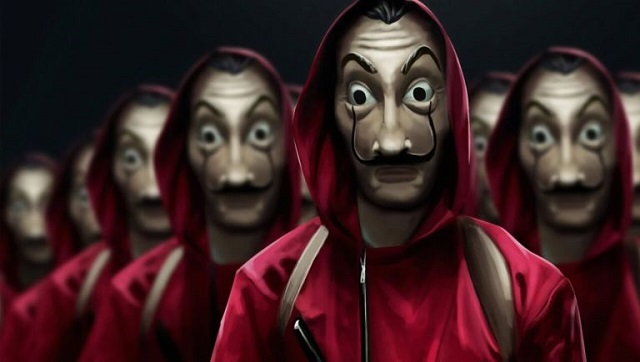Bollywood filmmakers obsessed with remakes need to watch
Money Heist: Korea
. The show is a textbook on how to go about retelling popular content with near scene-for-scene faithfulness and yet add enough local flavour to render the storyline an original cultural context. The new reimagination, Money Heist: Korea — Joint Economic Area, is broadly similar in terms of characters and plot progression while adapting Alex Pina’s original Spanish crime thriller series
La Casa de Papel
(Money Heist to the English-speaking world), which today commands global cult frenzy after five seasons. Yet, writer Ryu Yong-jae and director Kim Hong-sun’s reimagined saga adds enough K-drama elements to make Money Heist: Korea an altogether original viewing experience, replete with
K-culture
references that include all-important BTS references in the screenplay. Writer Yong-jae and director Hong-sun’s idea to recreate Money Heist in the Korean context also becomes interesting given the fictional political backdrop against which they base the suspense drama. The setting is 2025 when, the story imagines, South and North Korea are on the brink of unification and have therefore decided to set up a Joint Economic Area. The series retains all essential protagonists including the criminal mastermind The Professor (played here by Yoo Ji-tae), who puts together a gang of thieves for the heist. Like the original, the thieves are code-named after names of cities around the world, but unlike Alex Pina’s series their objective is slightly different — they plan to rob the mint in the Joint Economic Area, which gives the story an economic context that is specific to Korea. To underline the financial instability that such a crime could trigger off if it is indeed pulled off, the show uses the percolation of South Korean culture all across the Korean peninsula, including areas that were once North Korea. Pyongyang is all set to see a sellout concert of BTS, something unthinkable as of now with the North having banned K-pop that emerges from the South. Writer Yong-jae and director Hong-sun, in fact, have been smart enough to liberally sprinkle references to BTS, their hit songs and their ARMY at various points in the narrative, to enhance global viewership base for their show.
 Korean adaptation of Netflix’s Spanish show Money Heist in the making[/caption] With Money Heist: Korea catching on, the obvious question has already started doing the rounds among fans here: Will there be a Money Heist India? Not yet, at least not one that is coming officially from Netflix. An unofficial ‘remake’, however, is rumoured to be on. Unconfirmed reports doing the rounds of sundry portals state Abbas-Mustan’s upcoming film Three Monkeys will has shades of the hit Spanish show, casting Arjun Rampal in a role that bears similarity to that of The professor. No one among the film’s cast or crew have, however, officially confirmed or denied such reports so far. Abbas-Mustan have a long line of directorials that have drawn inspiration from foreign scripts and turned them into mainstream fare that are quintessentially Bollywood. Think Baazigar (inspired by A Kiss Before Dying), Daraar (Sleeping With The Enemy), Humraaz (A Perfect Murder), Ajnabee (Consenting Adults), Aitraaz (Disclosure), or Naqaab (Dot The I). The duo’s other upcoming film right now, Penthouse, is also said to be a remake — of the 2008 Belgian thriller Loft. Adding a bit of Money Heist magic in their new film would, however, be a wholly different challenge, if for Abbas-Mustan are indeed down to such a plan of action. This one, after all, has been a pop culture phenomenon like none before. Vinayak Chakravorty is a critic, columnist and film journalist based in Delhi-NCR. Read all the
Latest News
,
Trending News
and
Entertainment News
here. Follow us on
Facebook
,
Twitter
and
Instagram
.
Korean adaptation of Netflix’s Spanish show Money Heist in the making[/caption] With Money Heist: Korea catching on, the obvious question has already started doing the rounds among fans here: Will there be a Money Heist India? Not yet, at least not one that is coming officially from Netflix. An unofficial ‘remake’, however, is rumoured to be on. Unconfirmed reports doing the rounds of sundry portals state Abbas-Mustan’s upcoming film Three Monkeys will has shades of the hit Spanish show, casting Arjun Rampal in a role that bears similarity to that of The professor. No one among the film’s cast or crew have, however, officially confirmed or denied such reports so far. Abbas-Mustan have a long line of directorials that have drawn inspiration from foreign scripts and turned them into mainstream fare that are quintessentially Bollywood. Think Baazigar (inspired by A Kiss Before Dying), Daraar (Sleeping With The Enemy), Humraaz (A Perfect Murder), Ajnabee (Consenting Adults), Aitraaz (Disclosure), or Naqaab (Dot The I). The duo’s other upcoming film right now, Penthouse, is also said to be a remake — of the 2008 Belgian thriller Loft. Adding a bit of Money Heist magic in their new film would, however, be a wholly different challenge, if for Abbas-Mustan are indeed down to such a plan of action. This one, after all, has been a pop culture phenomenon like none before. Vinayak Chakravorty is a critic, columnist and film journalist based in Delhi-NCR. Read all the
Latest News
,
Trending News
and
Entertainment News
here. Follow us on
Facebook
,
Twitter
and
Instagram
.
Money Heist: Korea is a winner as it follows the original Spanish template but adds K-culture exotica to it
Vinayak Chakravorty
• July 1, 2022, 11:43:22 IST
There’s political commentary, too, as socio-economics of the capitalist South mixes with that of the North, officially a socialist state.
Advertisement
)
The core idea creates room for political commentary, too. The socio-economic reality of a fictitious unified Korea creates room for insecurity among citizens on both sides, particularly of the erstwhile deprived North. While demolishing borders between the two Koreas opens up scope for the goodies such as K-pop concerts, it also allows the script to deliberate over what would probably happen to common people if the financial reality of the capitalist South was to get mixed up with that of the North, officially a socialist state. The fact is underlined in a scene involving Tokyo, imagined here as a North Korean woman with military training and played by Jeon Jong-seo. With the borders gone and Koreans allowed to travel freely across the peninsula, Tokyo heads to Seoul for a better life but she will be disappointed soon enough. The best offer she gets is to work as waitress, unless she is game to make more money by becoming an escort because men in the South reportedly have a fetish for girls from the North. Tokyo’s situation, which will prompt her to accept The Professor’s offer and join the gang, underlines an important note of universality in the Korean version. Beyond its glossy K-pop tributes and K-culture influences, the series stresses upon what almost every crime drama ever did: Crime is born out of the exploitation of the poor by the rich, and that there is hardly anything else that actually divides humanity beyond the chasm between the haves and the have-nots. [caption id=“attachment_10249211” align=“alignnone” width=“300”]
End of Article